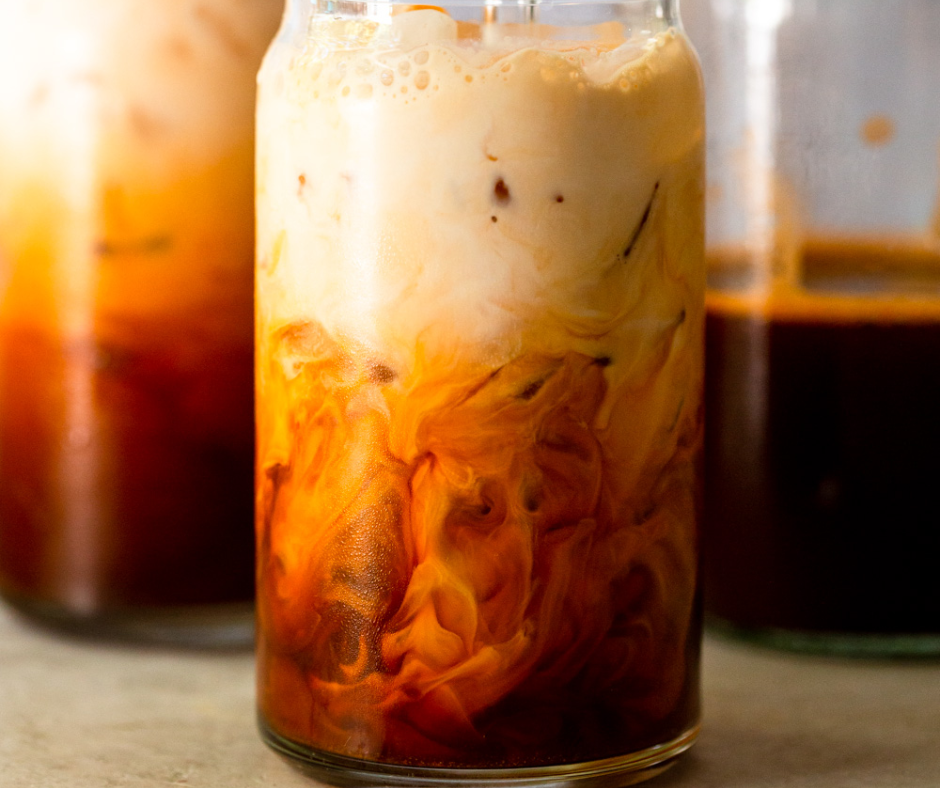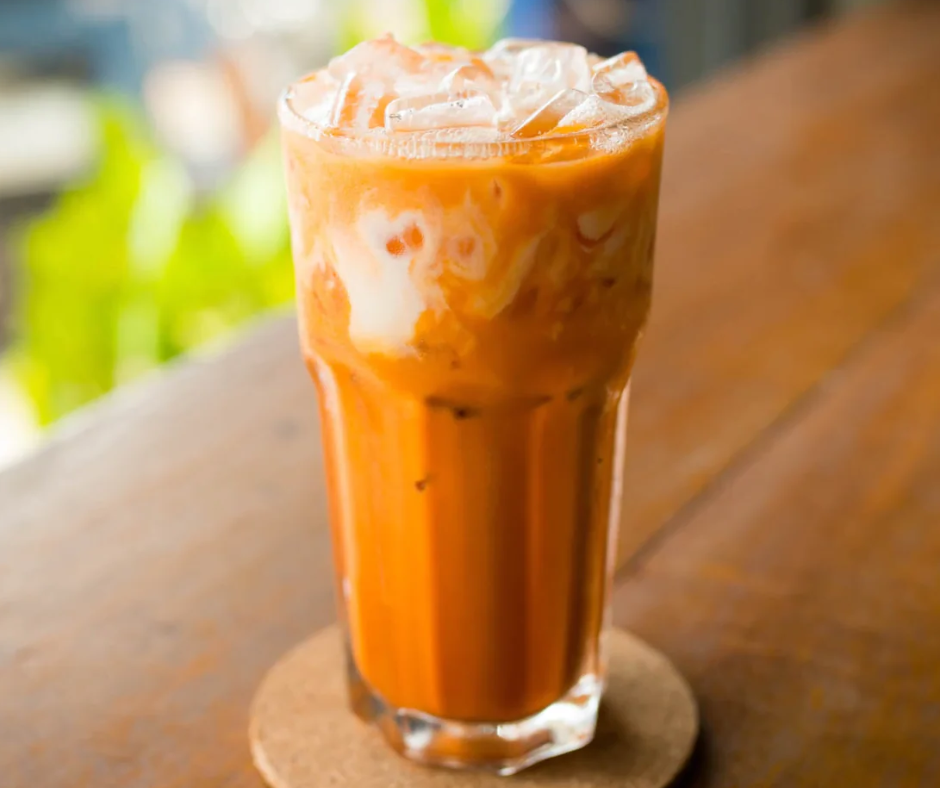Understanding The Caffeine in Thai Tea
Understanding the Caffeine in Thai Tea can be important for those who enjoy a delicious cup of Thai tea. Thai tea is a popular beverage made from tea leaves, spices, and sweetened condensed milk. It has a unique and flavorful taste that has captivated the taste buds of many tea lovers. This article will explore the factors influencing the caffeine levels in Thai tea and compare them to coffee.
Factors Influencing Caffeine Levels In Thai Tea
The caffeine content of Thai tea can vary depending on several factors:
- Type of tea leaves: Thai tea is usually made from a blend of different tea leaves, including black tea and various herbal teas. Black tea typically contains more caffeine compared to herbal teas. Therefore, the proportion of black tea used in the blend can impact the overall caffeine content.
- Brewing time: The longer the tea is steeped, the more caffeine will be extracted. If you prefer a stronger cup of Thai tea, it is likely to have a higher caffeine content. Conversely, brewing for a shorter time can reduce the caffeine levels if you prefer a milder taste.
- Additives: Thai tea often includes sweetened condensed milk and other flavorings. While these additives do not directly impact the caffeine content, they can influence the perceived effects of caffeine. Sugar, for example, can provide a short burst of energy followed by a crash, which may make the presence of caffeine more noticeable.
Comparison Between Thai Tea And Coffee
Thai tea and coffee are both popular beverages that provide an energy boost, but they differ in terms of flavor and caffeine content:
- Flavor: Thai tea has a distinct flavor profile characterized by sweetness, creaminess, and spiciness. It is often served over ice, making it a refreshing option for hot weather. On the other hand, coffee has a strong and bold taste that can vary depending on the brewing method and bean origin.
- Caffeine content: The caffeine content of Thai tea is generally lower than coffee. On average, an 8-ounce cup of Thai tea contains about 20-60 milligrams of caffeine, while the same amount of coffee can contain anywhere from 95-200 milligrams. However, it’s important to note that the caffeine content can vary depending on the factors mentioned earlier.
- Effects on the body: Caffeine affects individuals differently, but in general, it stimulates the central nervous system and can increase alertness and focus. Thai tea’s lower caffeine content may provide a more subtle energy boost than coffee, benefiting those sensitive to caffeine or who prefer a milder pick-me-up.
In conclusion, understanding the caffeine content of Thai tea can help you make informed choices about your beverage preferences. Factors such as the type of tea used, brewing time, and additives can influence the caffeine levels in Thai tea. Additionally, comparing Thai tea to coffee reveals flavor and caffeine content differences. So, whether you enjoy a cup of Thai tea for its unique taste or appreciate the stronger kick of coffee, it’s helpful to know the caffeine content of your drink.
Monitoring Your Caffeine Intake With Thai Tea
If you are a Thai tea fan, you may wonder how much caffeine is in your favorite beverage. Understanding the Caffeine in Thai Tea can help you make informed choices about your consumption and manage your caffeine intake effectively. Let’s explore the secrets of Thai tea’s caffeine content.
The Role Of Tea Leaves And Brewing Time
The Caffeine in Thai Tea varies depending on several factors, including the type of tea leaves used and the brewing time. Thai tea is typically made from a blend of black tea leaves, which naturally contain caffeine. When brewing Thai tea, the longer the brewing time, the more caffeine will be extracted from the tea leaves.
It is important to note that the exact caffeine content in Thai tea can vary from brand to brand and even between different recipes. Some Thai teas may have a higher caffeine content due to the specific blend of tea leaves used or the brewing methods employed by different manufacturers. Therefore, it may be beneficial to check the packaging or consult the manufacturer’s information for more accurate caffeine content details.
Considering Serving Size And Adjusting Consumption
Another crucial factor to consider when monitoring your caffeine intake is the serving size of Thai tea. The typical serving size of Thai tea is around 8 ounces, but this can vary depending on where you order or prepare it. This means that the amount of caffeine in each serving may differ depending on the particular beverage’s concentration.
To manage your caffeine intake with Thai tea, consider adjusting your consumption based on your personal tolerance and caffeine sensitivity. Reducing the number of servings or opting for a smaller size can be a good strategy for those more sensitive to caffeine or considering limiting their intake. You can also try diluting your Thai tea with water or opting for decaffeinated versions if available.
Pay attention to your body’s reaction to caffeine and find a balance that works for you. Some individuals may be more tolerant of caffeine and can enjoy several servings of Thai tea without experiencing any adverse effects. However, if you are sensitive to caffeine or have any underlying health conditions, it is advisable to consult with a healthcare professional for personalized guidance.
In conclusion, monitoring your caffeine intake with Thai tea involves considering the role of tea leaves and brewing time, being aware of serving size, and adjusting your consumption accordingly. While Thai tea typically contains caffeine due to its black tea base, the exact caffeine content can vary. By paying attention to these factors and personalizing your consumption, you can enjoy Thai tea while managing your caffeine intake effectively.
Conclusion
In conclusion, Thai tea offers a delicious and unique flavor profile that appeals to many enthusiasts. The Caffeine in Thai Tea can vary depending on several factors, such as the brewing method, tea leaves used, and the proportions of tea to other ingredients.
While Thai tea generally contains less caffeine than coffee, it is still important to be mindful of your caffeine intake, especially if you are sensitive to its effects or have health concerns. If you enjoy Thai tea but want to reduce your caffeine intake, there are a few tips you can follow.
Thai Tea’s Caffeine Content And Its Variability
The Caffeine in Thai Tea is less than coffee, averaging about 20-60 mg per cup. However, it’s important to note that the caffeine content in Thai tea can vary depending on various factors, such as the brand, brewing time, and the type of tea leaves used. Some brands may use a combination of black tea and other ingredients, such as herbs or spices, which can affect the overall caffeine content.
If you’re looking for a lower caffeine option, consider using decaffeinated Thai tea or opting for herbal blends that don’t contain any tea leaves. However, remember that decaffeinated Thai tea may still contain trace amounts of caffeine.
Tips For Managing Caffeine Intake With Thai Tea
If you enjoy the unique flavors of Thai tea but want to manage your caffeine intake, here are a few tips to consider:
- Choose lighter brews: Brewing Thai tea for a shorter period or using fewer tea leaves can result in a lighter, less caffeinated cup.
- Opt for herbal blends: Explore caffeine-free herbal blends, such as those made with various herbs and spices.
- Decaffeinated options: Look for decaffeinated Thai tea options that still offer delicious flavors without the full caffeine content. However, note that decaffeinated teas may still contain minimal amounts of caffeine.
- Limit intake: Moderation is key. Enjoy Thai tea as part of a balanced diet, and be mindful of your overall caffeine consumption from all sources.
Remember, everyone’s caffeine tolerance and sensitivity can vary. Consulting with a healthcare professional or a registered dietitian is always a good idea if you have specific health concerns or want to manage your overall caffeine intake.
Thai tea is a delightful beverage with unique flavors and aromas. While it generally contains less caffeine than coffee, its caffeine content can vary depending on several factors. By being mindful of your caffeine intake and making informed choices, you can continue to enjoy Thai tea while keeping your caffeine levels in check.
FAQ about Caffeine in Thai Tea: Unlocking the Secrets of Thai Tea’s Caffeine Content
Q: Is Thai Tea high in caffeine?
A: Thai Tea does contain caffeine, but the caffeine content is relatively low compared to coffee or energy drinks.
Q: How much caffeine does Thai Tea have?
A: The exact amount of caffeine in Thai Tea can vary depending on the brand and how it is prepared. On average, an 8-ounce serving of Thai Tea may contain around 20-60 milligrams of caffeine.
Q: Is Thai Tea safe to consume for people with low caffeine tolerance?
A: If you have a low caffeine tolerance or are sensitive to caffeine, it’s important to be mindful of your Thai Tea consumption. While it has less caffeine than other beverages, it may still affect you. Consider opting for caffeine-free versions of Thai Tea to enjoy its flavor without the caffeine.
Q: Are there any other ingredients in Thai Tea that I should be aware of?
A: Yes, Thai Tea often contains sugar, which contributes to its energy-boosting effects. If you have concerns about the sugar content, you may want to limit your consumption or choose alternative options with less sugar.
Q: Can I find caffeine-free Thai Tea in Thailand?
A: It may be challenging to find caffeine-free Thai Tea in Thailand since the common practice among street vendors, cafes, and restaurants is to use Thai Tea packets rather than brewing and mixing the ingredients themselves. However, it’s worth asking if caffeine-free options are available.
Q: Can Thai Tea provide an energy boost?
A: Yes, Thai Tea can provide an energy boost due to its caffeine and sugar content. However, it’s important to consume it in moderation and be mindful of your overall caffeine intake.
Q: Is Thai Tea a healthy beverage option?
A: While Thai Tea can be enjoyed as a delicious and refreshing beverage, it’s important to be aware of its caffeine and sugar content. Excessive consumption of caffeine or sugar may have negative effects on your health. It’s always advisable to consume any beverage in moderation and consider healthier alternatives if necessary.
Q: Are there any potential health concerns related to Thai Tea?
A: Consuming Thai Tea in moderation is generally safe for most individuals. However, if you have specific health conditions or sensitivities to caffeine or sugar, it’s recommended to consult with a healthcare professional to determine if Thai Tea is suitable for you.
Similar Posts & Resources
Before we dive into the secrets of Thai tea’s caffeine content, let’s take a moment to explore some other types of tea and their caffeine levels.
Exploring Caffeine In Other Types Of Tea
While Thai tea is known for its unique blend of flavors, it is not the only tea that contains caffeine. Many types of tea derive their caffeine content from the camellia sinensis plant.
Here’s a breakdown of some popular teas and their approximate caffeine content:
- Black Tea: On average, black tea contains around 40-70 milligrams of caffeine per 8-ounce cup. The exact amount may vary depending on brewing time and water temperature.
- Green Tea: Green tea typically contains less caffeine than black tea, with an average of 20-45 milligrams per 8-ounce cup. The slightly lower caffeine content is due to differences in processing methods.
- White Tea: The least processed of all teas, white tea is known for its delicate flavor and lower caffeine content. It generally contains around 15-30 milligrams of caffeine per 8-ounce cup.
- Herbal Tea: Herbal teas, such as chamomile or peppermint, are naturally caffeine-free as they do not derive from the camellia sinensis plant. They offer a great alternative for those looking to avoid caffeine altogether.
Health Conditions And Caffeine Considerations
While caffeine can boost energy and mental alertness, it’s important to consider its effects on your health. Certain individuals may be more sensitive to caffeine due to underlying health conditions or personal factors.
Here are a few factors to consider:
- Pregnancy: Pregnant women are generally advised to limit their caffeine intake to avoid potential risks to the developing fetus. It’s recommended to consult with a healthcare professional to determine a safe caffeine limit during pregnancy.
- Anxiety or Sleep Disorders: Individuals with anxiety or sleep disorders may find that caffeine exacerbates their symptoms. In these cases, reducing or eliminating caffeine consumption may be beneficial.
- Medications: Some medications may interact with caffeine, leading to adverse effects or reduced effectiveness. If you’re taking any medications, consult with your healthcare provider to determine if there are any interactions to be aware of.
- Personal Sensitivity: Everyone’s tolerance to caffeine varies. Some individuals may experience jitters, increased heart rate, or difficulty sleeping even with small amounts of caffeine. It’s important to listen to your body and adjust your caffeine intake accordingly.
While Thai tea does contain caffeine, the exact amount can vary depending on factors such as the brand and brewing method. If you want to reduce your caffeine intake, try decaffeinated Thai tea or herbal tea alternatives.
Remember, moderation is key. If you enjoy Thai tea but are concerned about caffeine consumption, you can still enjoy it as part of a balanced diet and lifestyle. Listen to your body, be mindful of potential health considerations, and make choices that align with your well-being.



